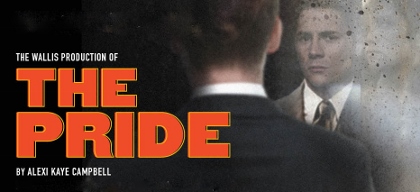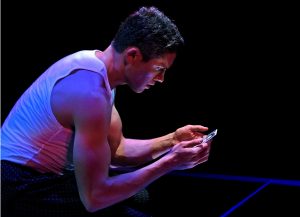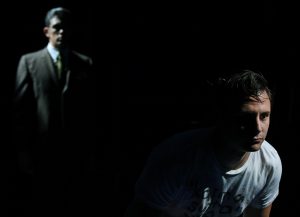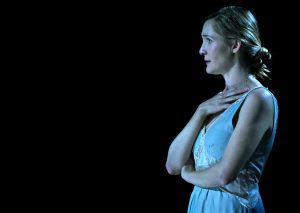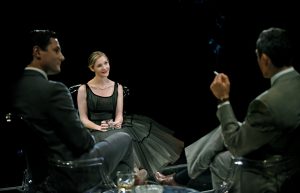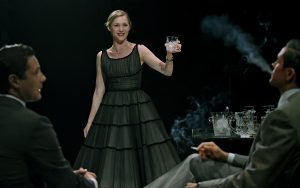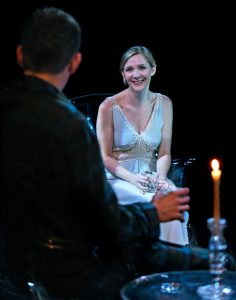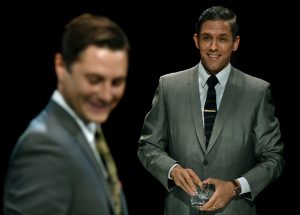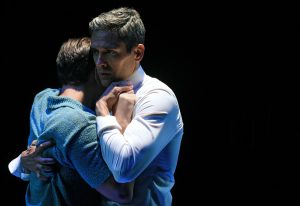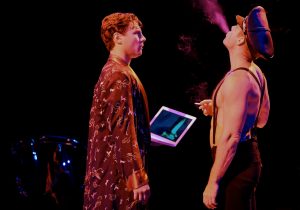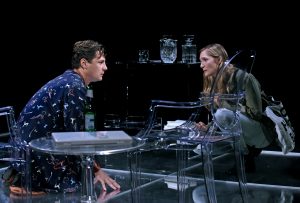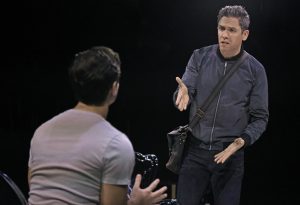LOVING YOUR OPPRESSOR
The audience is delighted when a character in Alexi Kaye Campbell’s beautifully written play The Pride tells another, “Stop sucking the dick of your oppressor!” It’s a moment of explosive clarity, in a work that never stops asking questions.
Is it possible a gay man in closeted London of 1958 might live a life of greater inner certainty and emotional connection than a similar gay man in the relative openness of 2008?
Does a woman who seems to push her husband into the arms of another man have the right to be shocked and appalled when she discovers she has succeeded?
Is desiring a rent boy who pretends to be a Nazi always a manifestation of self-loathing?
The play begins in 1958. London couple Sylvia (Jessica Collins) and Philip (Neal Bledsoe) are dining out with Oliver (Augustus Prew). She is a former actress, now an illustrator for the children’s book Oliver is writing. Philip is an estate agent, unhappy with his work. At first, it’s gratifyingly hard to tell what the tone is meant to be or what all of it means. Undercurrents and inchoate longings abound. Everything is connected, and nothing is random about what these people say or do.
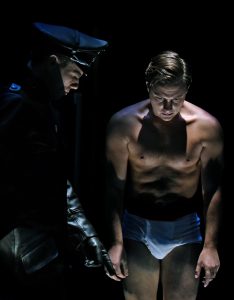 Philip’s unhappiness runs much deeper than we first imagine. Sylvia’s brittle affability masks loneliness and terror. And though nothing goes as Oliver hopes, his sexual and emotional awakening with Philip fosters a true acceptance and understanding of his own nature—even as it leads Philip to unaccountable violence and Sylvia to despair.
Philip’s unhappiness runs much deeper than we first imagine. Sylvia’s brittle affability masks loneliness and terror. And though nothing goes as Oliver hopes, his sexual and emotional awakening with Philip fosters a true acceptance and understanding of his own nature—even as it leads Philip to unaccountable violence and Sylvia to despair.
The same actors play characters with the same names in 2008. London couple Philip and Oliver have split up because of Oliver’s many anonymous infidelities. Sylvia is Oliver’s friend who tries to get them back together. Oliver loves Philip, but feels compelled to seek out punishing, often dangerous sexual situations, most notably with Matthew Wilkas as a dominant Nazi for hire and in a public bathroom encounter that draws blood.
In 1958, the Oliver character comes to self-awareness, however sad. In 2008, Oliver is at war with himself as well as the world around him, and it doesn’t appear there will be any winners. The stories in each time-period progress and overlap through two acts of fascinating wordplay and increasing stakes. The actors become the different characters mostly off-stage, until, in the second act, when we see some of their transformations on-stage, in scenes with an almost balletic grace.
The Lovelace is a small black box theater, configured here in the round, but director Michael Arden almost magically makes the space feel expansive, with his own set design created mainly from plexiglass and fractured light. His staging of the four actors is masterful; elegant and restrained where needed, yet he is unafraid to cut loose when the moment arises. The flow he builds is rhythmic, musical, and intense.
Augustus Prew is adorable and appealing in the 1958 incarnation of Oliver. He lets the character’s sadness emerge naturally, without letting self-pity take over. After a shocking betrayal at the end of the first act, Prew finds great dignity in the character’s utter transparency and vulnerability. In the 2008 scenes, Prew manages to retain our goodwill, even as the character’s self-involvement keeps him from finding love and connection.
As Sylvia in 1958, Jessica Collins gives a shattering performance. When she finally confronts Oliver, she begins as the soft-spoken illustrator who hopes the more established writer will work with her again, and ends in a fury of betrayed outrage and loss. The character is less central to the 2008 storyline, but Collins’ work is always persuasive.
Philip is a tortured closeted gay man in 1958 and a happy, well-adjusted out gay man in 2008. Neal Bledsoe gives both iterations of the character dignity and kindness. As three different characters, Matthew Wilkas is marvelous, especially when he swaggers around as a funny, loutish editor of a lads’ magazine who hires 2008 Oliver to write a piece about gay sex. Wilkas never settles for caricature. He finds real pathos along with his well-earned laughs.
Technical work is top-notch, with Travis Hagenbuch’s lighting and Joshua D. Reid’s sound design adding texture and a haunting resonance. Danae Iris McQueen’s costumes are also excellent. She has an eye for what matters—always aware of the telling detail that helps make the actors’ performances vibrant and real. I’m remembering a sublime pair of orange pumps, and a gold chain that wouldn’t be out of place on a rap star.
The Pride is convincing, moving, funny, smart, inventive, and just about as good as it gets.
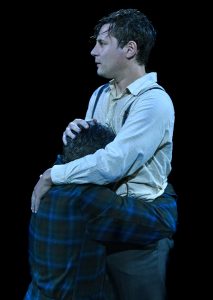 photos by Kevin Parry for The Wallis
photos by Kevin Parry for The Wallis
The Pride
Wallis Annenberg Center for the Performing Arts
Bram Goldsmith Theater
9390 N. Santa Monica Blvd in Beverly Hills
ends on July 9, 2017
for tickets, call 310.746.4000 or visit The Wallis
